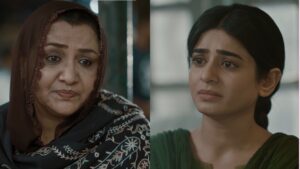Pakistani drama’s are not the ideal place to go to for wanting to watch a good show with strong female representation, since our nation’s most popular drama’s have involved cheating, misogyny and passive women forgiving their abusive husbands. But we must talk about how this year there weren’t any positive depictions of women in our drama series. Female friendships is one of the tropes that count for good representation but among the currently playing drama’s on our screen “Hum Kahan Kay Sachay Thay” and “Azmaish” and “Ishq Hai“, the plotline of both dramas revolve around women battling with each other over a man.
“Hum Kahan Kay Sachay Thay” features two women Mashal and Mehreen who are in love with the same man Aswad, and soon the former begins to plot ways to belittle and remove the latter’s presence so that she could have the man all to her self. In the latest episode we watch how Mashal (played by Kubra Khan) spots Aswad (played by Usman Mukhtar) and Mehreen (played by Mahira Khan) together after she expressed her desire to marry him. So then Mashal proceeds to sneak into her room and read her diary, and then she lies to Aswad that Mehreen smokes and leaves cigarette marks all over the latter’s clothes to frame her as guilty.
While in Azmaish the sole plot line surrounding women is step-sibling rivalry where two siblings plot together to remove their step-sibling Nimra (played by Yashma Gill) from their home, and in the recent few episodes we watch them fabricate a letter saying that Nimra has run away with her lover and send her back to live with her abusive father. Also in Ishq Hai which recently received a lot of negative backlash for featuring a male protagonist kidnapping the girl Isra (played by Minal Khan) he loves from her house and forcing her to marry him, and now in the recent episode the mother in law and sister are seen to be plotting to remove her presence from Shazaib’s life. In the latest episode they fabricate a way for Shahzaib to catch both Isra and her former lover Harris together in a room for him to assume she is cheating on him, which compels him to kick her out of the house.
A common belief within our society is “Only a woman is another woman’s worst enemy” and this mostly is seen as justification to keep producing shows where women are seen pitted against each other to win the attention of the man. But in our society today where women have become victims of patriarchal abuse and violence, it’s time we learned to debunk this belief and understand that women can become each other’s best friends and the support system to survive. Television shows have consistently kept peddling false beliefs that sexual harassment allegations are only done for social media clout, that women must forgive their abusive husbands in order to prove they are pure and good to be accepted by the society, or that it is completely acceptable for any woman to abandon her academic ambitions when her husband asks her to. The most common roles represented by women onscreen solely revolve around either playing the good woman or the bad woman, both whom are one-dimensional characters and are solely relevant in regards to how long they keep feuding to win the man. Through the presence of female friendships and strong women who are not solely existing to remain relevant to the men around them, we need to teach our audience that more women led shows need to empower women in recognizing their own independence and building up their support system with the other women in their lives.
One of the shows that has made efforts to prove that female friendships can help women in escaping abusive situations and build new lives was “Raqeeb Se”. In an interview with Something Haute, the writer for the show Bee Gul was asked why she chose to write about social issues like domestic violence and the internalized misogyny of women, she said it was to help women understand that they must support each other:
“We women need to understand each other…the hate that women have for each other and they insecurities that the have, it allows men to get away with everything”








